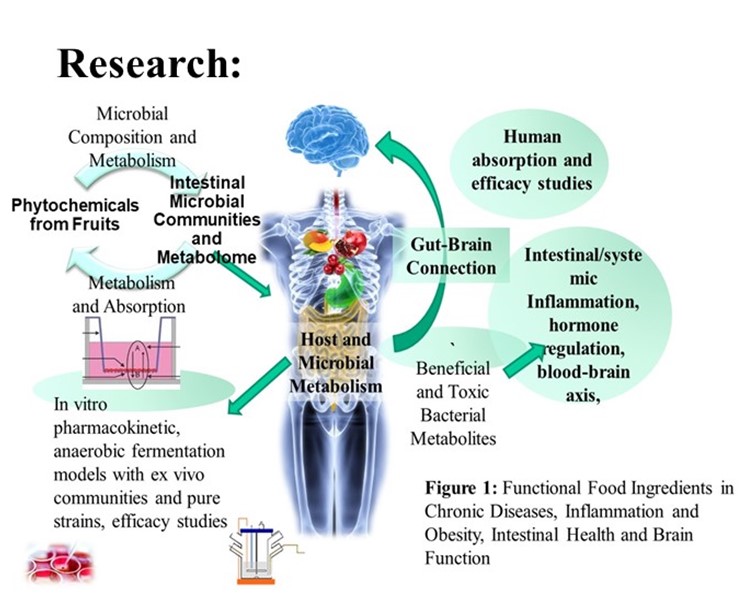
-
Susanne Talcott
- Professor
- Office:
- HEEP 431B
- Email:
- [email protected]
- Phone:
- 979-314-3854
Education
- Undergraduate Education
- B.S./M.S. in Nutrition, University of Bonn, Germany, 1998
- Graduate Education
- Food Science and Nutrition, University of Florida, Gainesville, FL, 2004
- Postdoctoral training, Pharmaceutics, University of Florida, Gainesville, FL, 2006
- Awards
- Excellence Award for Mentoring, Nutrition and Food Science Dept, Texas A&M University, 2011
- Excellence Award for Research, Nutrition and Food Science Dept, Texas A&M University, 2009
- ASN Mary Swartz Rose Young Investigator Award, 2009. American Society of Nutrition
- Courses Taught
- FSTC/NUTR 410: Nutritional Pharmacometrics of Food Compounds
- FSTC/NUTR 610: Graduate Pharmacometrics of Food Compounds
- FSTC 314: Food Analysis
- FSTC/NUTR 420 Sustainable Nutrition and Food Processing in Brazil
- FSTC/NUTR 420 Mediterranean Nutrition and Food processing in Italy
Areas of Expertise
- Dr. Susanne Talcott’s research focuses on translational pharmacokinetics and pharmacodynamics of botanical compounds and their physiological metabolites related to inflammation, cancer prevention, and intestinal health with a focus on human clinical trials.
Professional Summary

Research Focus
Millions of Americans consume plant-based foods, including dietary supplements and functional foods with the hope of preventing or even treating inflammation and associated chronic diseases. However, limited research is investigating safety, efficacy, and dosing recommendations of non-nutrient bioactive food compounds. Hence, consumers, public health care, as well as the food industry, have little to no guidance related to efficacy, safety and intake recommendations. The overall objective of our laboratory is to investigate pharmacokinetics and pharmacodynamics of bioactive plant compounds and their metabolites and their anti-inflammatory efficacy in the reduction of risk factors for chronic degenerative diseases such as cancer and cardiovascular disease and their underlying molecular mechanisms. , pharmacokinetics and pharmacodynamics and underlying molecular mechanisms in a translational research approach (bench to bedside) of polyphenolics in fruits and vegetables in collaboration with an interdisciplinary research team. It is our long-term goal to contribute valuable information to the future development of dosing recommendation for these non-nutrient food components that meets the needs of public health care, patients and consumers, and food and dietary supplement industry.
Support Students and Staff
Tara is from Phoenix, Arizona. She earned her B.S.in Human Nutrition in 2015 at Arizona State University, where she also obtained her M.S. in Human Nutrition under Dr. Corrie Whisner. Tara is currently working towards her doctoral degree in Nutrition under Dr. Susanne Talcott. Her research is focused on clarifying the mechanism by which gallotannin rich foods exert their anti-inflammatory properties within the human gut.
Ana Nava
Ana Emilia Nava is from Monterrey, Mexico. She holds a B.S. and M.S. in Biotechnology Engineering from Tecnologico de Monterrey, Mexico. Ana is working towards her doctoral degree in the Food Science and Technology department under Dr. Giuliana Noratto-Stevens. Her research interests focus on the effects of polyphenols in health. Ana is currently investigating the effects of polyphenols from Dark Sweet Cherry in Triple Negative Breast Cancer. Her career goal is to become an educator for future Food Scientists interested in the effects of foods in health.
Shannon Schmidt-Combest
Dr. Schmidt-Combest is from Freeport, TX and is an Assistant Research Scientist at Texas A&M. She earned her B.S. and M.S. at Texas A&M in Nutrition and Food Science and Technology, respectively. She worked for 4 years in the food industry at Pecan Deluxe Candy Company, Dallas, TX as a Food Technologist in the Research and Development Department. She returned to academia to complete her Ph.D. in Nutrition at Texas Woman’s University, Denton, TX under Dr. Cynthia Warren and Dr. Mindy Patterson. Dr. Schmidt-Combest currently manages the Talcott Research Lab clinical trials evaluating the biological and physiological effects of hydrolysable tannins in plant foods on human subjects. Additionally, she serves as the student coordinator for the Laboratory Research Training Program of ongoing USDA funded research projects.
Giuliana Noratto-Stevens
Dr. Noratto is from _______ and is a Research Scientist at Texas A&M. Her research focuses on dairy and plant foods bioactive compounds with focus on obesity-related diseases such as diabetes, cardiovascular disease, and cancer, using in vitro cell culture, in vivo animal models, and human clinical trials. She has ongoing research investigating the effect of polyphenolic compounds (anthocyanins) in dark sweet cherries on breast cancer cells and the gut microbiota-liver-brain axis. Currently, Dr. Noratto is evaluating polyphenolic compounds on overcoming multidrug resistance and evaluating their effect in detoxification mechanisms.
Dr. Noratto’s area of expertise includes researching dietary compounds and plant phytochemicals that can help human health at two levels of absorption: The upper gastrointestinal tract where they modulate cell signaling pathways to prevent or reverse disease; and the lower intestinal tract where they can change fecal bacteria populations and their metabolites to improve obesity-related and chronic diseases including diabetes, cardiovascular disease, and cancer. Dr. Giuliana’s current doctoral student is Ana Emilia Nava.
News
Texas A&M AgriLife Project to Focus on Chronic Disease Prevention https://agrilifetoday.tamu.edu/2023/10/04/texas-am-agrilife-project-to-focus-on-chronic-disease-prevention/
AgriLife Research to Investigate ‘mechanics’ of Botanical Compounds and Human Microbiota https://agrilifetoday.tamu.edu/2022/10/11/agrilife-research-to-investigate-mechanics-of-botanical-compounds-and-human-microbiota/
Publications
- View publications on PubMed